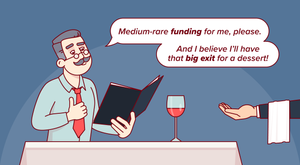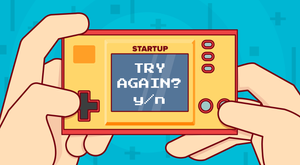Find this helpful?
This is just a small sample! Register to unlock our in-depth courses, hundreds of video courses, and a library of playbooks and articles to grow your startup fast. Let us Let us show you!
Submission confirms agreement to our Terms of Service and Privacy Policy.
Already a member? Login
AI Generated Transcript
Ryan Rutan: Welcome back to the episode of the startup therapy podcast. This is Ryan. Rutan from startups dot com, joined by Wil Schroder, my friend, the founder and Ceo of startups dot com. Well, let's go back in time. You've just come up with your first startup idea. You found a co founder, what's the very next thing that you plan to do
Wil Schroter: plan for divorce? That's the bingo. Today.
Ryan Rutan: We are going
Wil Schroter: to talk about
Ryan Rutan: something really important, which is that co founders often don't last. You may have garnered that from the title if you read it, if you're binge listening and are paying no attention to the titles, that is the title of today's episode.
Wil Schroter: Um, co
Ryan Rutan: founders often don't last and we're gonna spend some time today unpacking why that is um, and what we should be doing about this as founders as we progress through this, this
Wil Schroter: Journey. Alright, so before we get into this next topic, I just want to let you know what we talk about here is like 1% of the conversation, you know, really, this conversation is going on all day long online at groups dot startups dot com. Where Ryan and I pretty much talk endlessly with founders about every one of these topics. So if by the end of this discussion, you like the topic and you want to dig into it a little bit more with Ryan and I just had two groups dot startups dot com and we'll pick it up from there. Yeah, I think Ryan, the the problem is just like any other relationship when it's starting, it's always great because nothing has gone wrong yet, right. You know, that's the problem. First dates always great. We haven't lived together yet. Nothing has gone wrong yet. And we don't learn who are co founder is our life mate are, you know, spouse, whatever until we go through ship with them, right? Or we've been around long enough to know whether we want to be with them to begin with, which is why when we talk to founders and they're just putting their company together and they're saying, I've got two other co founders were trying to figure out the equity split. That's our biggest challenge. And I was like, no, it's not the biggest challenge right now, is to have a real conversation about if sh it doesn't work out and by the way, sh it usually doesn't work out. What do we plan on doing about it? No one has that conversation, Nobody has even yet. It happens all the time. It's crazy. Will
Ryan Rutan: we live here in shangri La with our unfunded pitch
Wil Schroter: deck. Why would we
Ryan Rutan: need to plan for that? Right. Right, Right. It doesn't occur to you. It doesn't occur to you for for all the right reasons, right? You're at that really excited. Uh, but vulnerable state, right? Where we're so into the idea and we're so happy that we found somebody else who likes our idea that it doesn't even occur to us to go looking for flaws or, or holes in the story or whether this person even has applicable skills to what I'm doing, right? Like we see this a lot of places like startup weekend, right, and nothing you can start up weekend, amazing stuff has come out of that, some wonderful things for the startup community,
Wil Schroter: but it's like
Ryan Rutan: going to a speed dating and like being forced into marrying somebody at the end of the speed round. Like not enough transpires there to be really sure that this is the person that you want to spend the rest of your startup with.
Wil Schroter: Pretty significant in our minds at that moment, we're thinking this person gets it, they love what I'm doing or maybe this couple of people get it or they're my friends from back in the day. Right. And so co founder must mean that equal shares of the company, mean equal contribution forever. And even though we all have equal shares forever, we all contribute equally forever. Without any thought to well wait a minute. Wouldn't be the case that like if one of the people on our team has a third of the company and they're there because they can, they're a great designer, that we may not need a designer in that capacity, a third of the company as much for the entire into the end of time. So why do they have a third of the company again? Or the simple one, what if I quit, right? Why is it that we think when we form companies that all the people that were forming them with are just going to stay on forever, like in what world would that make sense? And yet, and yet every time we throw all that stuff out the window, we don't even ask the questions. The what if questions. So today we're going to ask all the what if questions and if you're going through this for the first time, you will be so happy that you listen to these questions, you may ignore everything we have to say. That's on you, right? Feel free. It's your progress that said, I guarantee Ryan what we'll talk about today, it will come up and whether we prepare for it is gonna be the million dollar question.
Ryan Rutan: That's the difference. Right. Are you, are you prepared for that attack and that assault in that situation or not? In the vast majority. Alright, well, you, you pulled an interesting stat out on me a couple of days ago, which is that most co founders typically quit within the first year. Like if they're going to quit, it's typically within the first
Wil Schroter: Year, correct. And as you know, 62% of stats are made up so I can't guarantee you that the validity of that, that I liked it though. I liked it. It was a good stat.
Ryan Rutan: It's sure not irrelevant. It proves our point. So therefore we'll leave it. Right? Um
Wil Schroter: uh, well, look, here's the thing. You've got to compounding problems. You've got the, the fact that people get into a startup at which point they know the least about it. Right? So we're joining a startup when it hasn't been formed yet. We haven't had to work there yet. We haven't worked with any people. We don't even know what it does yet. Kind of a tough time to make a big commitment. Right? The second thing is the startup itself, regardless of our commitment. Also statistically has a very low probability of ever working, hence us not being there forever, even if we wanted to. Exactly. And so we've got to situations where the certainty of our longevity in the company, ours or anyone else's is by definition totally messed up. Right? And yet we make these binding contractual obligations to all of us ourselves included. That will be with it forever. Right? And then and then we're shocked later when it doesn't work
Ryan Rutan: out. Yeah. And then, and then we're mad that we have to deal with the problem that we we created simply by not recognizing that there could be a problem in the future. Um It seems so obvious in hindsight to that's the thing. I think that's what I think it's what's so aggravating about it when it happens, is that it's like, how did I not see this coming. Right. How was I not prepared for this, which just exacerbates the pain that you go through in that moment when you have to deal with that situation,
Wil Schroter: right? And so, let's let's just start from the back of the end for a second. Very few startups prepare, uh, you know, in their formative stages for what might happen if and when co founders leave, most of it's because they're just not thinking about that, it's kind of like when you're getting married, the last thing you're thinking about is getting divorced, although incidentally, that's the most important time to think about getting divorced um, in divorces suck. But being unprepared for these things sucks a lot. Unwinding A co founder that you made a bad decision on is so difficult later on, so giving even ounce of thought right now is worth exponentially more later. So we'll just we'll leave that caveat kind of out there. So that, as you're listening to what we're talking about, your thinking, you know, you know, this is gonna be a really expensive thing to overlook if I have that opportunity.
Ryan Rutan: Yeah, and and it is, and it is, it is, and, you know, using using the divorce analogy, we know how contentious those get, we know how how nasty that can become. And, you know, just even if you're just thinking, like, let's say it's it's it's a relatively simple one, let's just say that there aren't even any Children involved, right? This is just about the division of assets, right? And, and, you know, in a startup, those are fairly clearly delineated in most cases, here's where it becomes problematic. People want to start to argue about, well, okay, but that's the value now. What about the future value? This thing has the potential to go on and do these other things right? Like that's not part of the divorce arguments. So this becomes even more contentious because you're also talking about the potential the future or what what else this this could become, right? And that's that's the entire point, right? We're trying to grow these things. We're trying to to create these huge outcomes. And so, imagine what those conversations look like. Imagine how how cordial people can be um, when they've inflated the value of this thing in their mind. Um, and they also want to leave, but there's no provision for that. And we didn't talk about this before and they're they're they're fully vested, Um which may have happened from day one, which by the way, don't do that. I assume we'll talk about that at some point in this episode. Will um, yeah, so, you know, will's will's point. Absolutely accurate. Now, is the time, right? The beginning is the time you've already begun and you haven't done it then. Now is the time, Right? So regardless of of whether you're just getting started or you're well into this if you haven't done it now now is the time right now would be a good time
Wil Schroter: to do it. Here's here's the problem though, at the beginning. We get so fired up about the idea, right? And you come to with your idea, I get fired up about it. I want to join, you know, we lock arms and run into this thing and we have the equivalent in almost every case of a shotgun wedding, right? We just met in Vegas, got drunk and now with the cathedral at three in the morning, getting married by Elvis, right? Like at that time, it seems like a really good idea. Yes,
Ryan Rutan: But what we, I still find it weird that you made us write that into the operating agreement, but
Wil Schroter: you know, it's gotta be, it's gotta be man, come on. And so, um, what ends up happening though is we're making probably the largest commitment of our lives at a time when we know the least about the outcome, right? And we're saying we're making all these assumptions about folks that, that we're going to make this, uh, this relationship with and it is a relationship at every possible level. The interpersonal nature of it matters a lot more than people think. And so when we get started, you and I vibe on this one thing, which is this cool idea, right? And I want to do something new and you want to do something new. We both loved the idea and we both want to make it happen. The problem is we don't really know each other yet, right? Right. Well. And you could say, oh well we worked together on a previous job, not the same thing,
Ryan Rutan: not the same thing,
Wil Schroter: It's again, we're gonna torture this marriage analogy to death here. But um, it's the equivalent of we dated a bit, but we haven't lived together yet, Right. That's when things start to get real were combined finances, we're married, we're kind of stuck with this thing at which point both of us have run through all of our savings and we don't know how we're gonna pay our bills anymore. That's when it's not the same relationship anymore. And by the way, that happens in almost every single startup, right? So it's not an anomaly,
Ryan Rutan: right? No, no, it's, it's, it's a matter of kind of when that happens, Not if,
Wil Schroter: Right, right, right. And so at that point things start to go sideways, right? And we start to realize, man, this person is kind of a jerk, right? Or um, hey, you were in it in good times when everybody's giving us high fives and some seed capital, but now the money's run out and now you're running away while the rest of us have to pick up the slack for you, right? We didn't, Again, we didn't know who we each other were until we had these interactions. And so we have to account for the fact that no matter who this person is, no matter how well we think we know them. We're just not really going to know them well enough and they won't even know themselves nor ourselves until we go through this journey and this journey is going to be painful and we don't know how people are gonna react, you know, by the way, I just want to mention if what we're talking about today sounds like the kind of discussion you wish you were having more often, you actually can, you know, we're online all day every day, working through exactly these types of topics with founders, just like you. So any question you would have, or maybe some problem you just want to work through. We're here and we love this stuff and we're easy to find, you know, head over to groups dot startups dot com and let's just start talking.
Ryan Rutan: Yeah, and then there's there's so much at stake, right? We've we've talked about this in a couple of different ways. Um we did an episode about, you know how sometimes startups outgrow people, sometimes people outgrow startups, right? Both of those things can happen, right? I've seen co founders leave because they essentially couldn't keep up with the company anymore. Right, going back to, I think you said, you know, there was a designer really important in the beginning, but not necessarily somebody that needs a third of the company and a third of the control over the
Wil Schroter: outcome of the company, that
Ryan Rutan: that part of it may be well settled now um to break away from the the marriage analogy for for a minute, think about the friends that you grew up with and then the ones that you still hang out with if any, and now the ones that you you you hang out with now, right? The startup goes through a similar evolution to a human life, right? As it grows up, what it needs and what it finds interesting and what it benefits from change entirely, right? But the same thing can also happen with a co founder who maybe they're a bit more advanced in the rest of the team. I've seen co founders leave because the company wasn't moving fast enough or because their skill set that the company wasn't at a point where they could fully be utilized and so they say, I'm going to go somewhere else, I'm going to go somewhere where I can be fully utilized, where I can use my superpowers to the fullest of their extent. Still the same problem if you didn't account for this up front, Right? So it doesn't really matter why, and there are a lot of reasons why um the outcome is still the same if you didn't plan for this, if you don't have this, you know, provision within the operating agreement, having at least having the discussion around it. Um it's going to be far far worse, but as the startups change, as the people change, right, they may have been exactly the perfect person for that, like 0 2000 users or for the 1st 12 months as you're building the business and now they're not and that happens and that's okay. As long as you plan for
Wil Schroter: it, here's the most consistent example. I see time and time again. Um I've got the idea and let's say it's a technology idea, it often is let's say it's a mobile, right? And I want to go find a technical co founder. And so I finally find a technical co founder that's willing to build this thing. And so they're now they're my co founder, are they my co founder? Because I like this person, we've had cycles together. No they're my co founder because at that moment I need someone to build my app for free. And so I make them a technical co founder with no concept for whether or not they can they can exist in any capacity beyond building this this M. V. P. Of an app. Do they have leadership
Ryan Rutan: skills? Do they can they can they can they run a team can they do anything or they just a good builder? Right.
Wil Schroter: Right. Conversely I'm gonna come in from the type of co founders side, the person I just decided to build an app with all they had was an idea. They're actually not capable of doing anything beyond that. Beyond having the idea. They don't know marketing, there's no fundraising. They don't management, they don't know anything. And yet I'm tying my boat to this person. What? Right. That doesn't make any sense. And so in both cases assuming things don't work and they often don't work. What do I do about that? Right. And, and here's what I would say. What are all the assumptions I'm making right now about that
Ryan Rutan: person.
Wil Schroter: Right. How many days are we running? This podcast is gonna be a long one to go. You know, Ryan, this is, we should probably just focus on this for a second. Right. I think we talked about it in another episode, the unspoken contract that, that we make someone else without talking to them about it at all. Right. How much time you're going to put in, How, you know, when the going gets tough, how much you're gonna stick it out, how much personal capital you're going to put in, how many of your connections you're going to put in all of those things? I assume Ryan, my new co founder, you are going to put all of those things into the company because I assume I am, But I'm just gonna not bring that up. I'm not gonna ask you,
Ryan Rutan: nope. Yeah, why would I write, why would I, because that's what needs to happen for the vision that's in my head to manifest and exist in the future. Whether that's the same vision you have or not. We won't know because we didn't talk about it. Right. Right. You just, you put yourself in these really dangerous situations and and these are these are not insignificant assumptions, right? Um, they're not insignificant at all. Um, and any one of those falling flat could absolutely destroy things if if not more than the relationship. Right? And often that's where we see it start to break down. It's not even like, oh, you didn't make those introductions that I thought you would make. So therefore the business fails because we needed those introductions. It starts to fall apart because you didn't make those introductions. And I'm kind of salty that you didn't make those introductions. Like why wouldn't you do that? Like, that was the expectation that I had of you and in the conversation that I had all by myself, of course you said yes. So why aren't you doing it now? Right. So I think that, you know, it can begin to break down just over the relationship. Um, and often again, like, it's it's a death by 1000 cuts because we're making so many assumptions and individually they may not be that important. But collectively, they define the quality of that relationship. And if the quality of the relationship goes, the co founder goes at some point, right? Like it's just it's very rare that you see a company where you have like two warring heads that somehow still managed to maintain a company. I think I've seen it in a movie, but never in
Wil Schroter: real life. It doesn't actually I've had this happen in a number of cases with co founders, you know, it's part of this journey and I'll give an example and I'll be specific about it. Um, the last company I did, this company called Unsubscribe dot com, I had two co founders that I had recruited as an idea I had for a long time is back before people knew how to get off of junk mail basically. And uh, a long time ago, uh, and I was in like four other companies that I had built that I was running and I recruited to my friends that I had met, which were both entrepreneurs themselves and the three of us got to work in this company. Now. They made an assumption there and, and it was the right assumption for them to make, they were just wrong about it. Right? Give me an assumption that if it's will's idea and he's the one bringing us in the company, he's going to be just as committed as we are wrong. I was not just as committed as they were right, because I had four of their freaking companies that I was running right right now. Your
Ryan Rutan: assumption was I'm going to bring these two in. So I don't have to do very much. I had the idea, I'm gonna let them execute. It'll be
Wil Schroter: great. Here's what I thought, I think this is a really good idea, which is why I'm gonna take the time and energy to, to make this happen, right? And if it winds up, winds up being this really, really good idea, I will quit the other stuff that I'm doing right or find some other way to manage it. Um, but I had never had that conversation with them. What a mistake, Right? So we get, we get the company up and running, Um, and we go to raise some capital and we were very fortunate in that for this particular company, investors were jumping over themselves to invest in the company. We raised all of our, all of our series a and like 24 hours, right? Um, I'll be honest, I've never done that before. So it's not like I do that all the time. That was the first. Um, and so, uh, the stakes are going up and investors are coming on some pretty big name investors. And, uh, and the two other co founders come to me and they say, hey, uh, you know, it's kind of game time. How in this are you? And I'm like, well, I'm totally in this like, yeah, but you're running for other companies. Like don't bullshit. It's like, how in this actually are you? And what I liked about that is that they brought the situation to the table, right? And here's what they said, They said, unless you're, is 100% as we are on a go forward basis. We're going to restructure the calf table, right? Um, with or without you and it was a tough conversation, right? And the conversation lasts like four hours like talk about a standstill, right? And in the end I was wrong. Okay. I just want to be very clear, right? They were right. They were willing to commit, the capital had come in with with the commitment to work. They're not the hail stopped by to work there, right. And I felt, I felt betrayed. Yeah, because I felt like I brought this whole thing together. It was my idea, etcetera. But here's what's so interesting about that here I am with the person with the idea of kind of bringing in getting it started and using some of my own resources to get it going. And even I was the one that didn't have the commitment. Okay. That's what I'm saying. It's not as easy as, it's not, it's not obvious at all right. Who the person is going to get voted off the island, right? In this case. It was me. And even I didn't realize it and I do this for a living and I'm gonna do a podcast about it right now. So it's, it's not like, it's obvious. It's not like, you know, um, we all know exactly who, who's going to get voted off the island. Um, and during that conversation Ryan as it's going back and forth as, as time is going on, I'm, I'm angry, right? I'm angry because I feel betrayed, right? Um, I feel like, hey, I said all this thing up and once this thing becomes something, then they mutiny on me and try to take the company from me and all this stuff, right? And, and, and even though in my heart of hearts, I knew that this was the right move. It didn't feel right,
Ryan Rutan: right? Doesn't feel good.
Wil Schroter: But guess what? I'm reasonable. Most people are not, I have empathy and reason, right? So while I'm a tough person to negotiate with at some level, you can always at least trust the fact that like, you know, I've got that bone in my body, everyone does.
Ryan Rutan: That's absolutely true. And, and, and often we see, you know, full on implosion because of that. You get to people who are unwilling or three or four people sometimes, um, where where it becomes a contentious thing and you know, somebody's getting voted off the island and, and when there's, there's no give and there was no provision before the fact for how to deal with that. You're just stuck it, can it, can you just end in stalemate, right? Which is the death of the startup company. Um, and again, like, you know, another memorable scenario for me, um, was when there were, you know, there were, there were four of us in a room, you me included. Um, and we were talking about our, our vision for startups dot com and what we, you know, hope that would become, and, and the amount of time we were willing to to put into it and you know, we could all foresee, you know, you know, riding this thing off into the future for as long as we needed to because we were loving what we're doing so much And then 1/4 voice popped in and was like 18 months and I'm out, that's my max on this, and the rest of us were like, what? Like it was so it was so utterly
Wil Schroter: shocking and
Ryan Rutan: like understandable in in hindsight, like, you know, once, once the position was explained why and all that, it was just so incongruous with the rest of the group, it was just like it was so funny to me, but like it's it's those situations right, that if you're not prepared for that, if you don't have a provision for how we deal with that, that's a huge, huge issue, right? Because you're talking about Fundamentally different decision making that lead to let's do this forever and let's push this thing to a sale in 18 months, right? You gotta do real different stuff to make those two things happen. Um so you know that I think that for me was probably the most memorable of the the the co founder dissensions, like like these these these agreements were all of a sudden, it's like we've never really talked about this before. Um you know, we have provisions for dealing with it luckily, but it was like, I didn't see that one coming right out of the out of the blue, you just never know
Wil Schroter: Remember that it's going to come from, right. Amazing. And it's usually not that explicit, right? Right? We we assume that the person, you know, that we're co founding with or that the persons that were co founding with are going to take this thing that the 10 years or however long it takes to to ride this out, right? Um, which is such, which is such a broken assumption because none of us even knows that that's true. Again, in my case, I started the damn company and didn't realize it wasn't true, right? When I, when I look back, I realize now that, um, there was no way I was going to be able to hold up my end of the bargain. And so we have to recognize on the onset that even if we have explicit conversations that everybody says I'm all in, it just means they're in until they're not in right. Everyone is in and committed until they're not committed until she goes wrong and they have to bounce because they can't make their mortgage right? That's part of this game. Yeah. And so I said, what we all agree that stuff can go sideways. Let's talk about how to plan for when it does right, the plan for divorce, hope for marriage. Okay. And there are very deliberate ways that we can set up a very fair structure between ourselves and our co founders, so that if things don't work out that we at least have an understood way of kind of bringing them back in alignment doesn't always go great. Even the prenup doesn't always work, right. Right? But at least sets an expectation for the foundation. Has that sound?
Ryan Rutan: Sure? Yeah. It gives you a framework for the conversation at a bare minimum. Right? And and, and at least there's a preemptive conversation that says another conversation like this could exist in the future when things are not all roses. Right?
Wil Schroter: So, I
Ryan Rutan: mean, Mike Moyer built a business around this,
Wil Schroter: Right? Yes.
Ryan Rutan: So there there is, there's obviously um enough of a enough of a challenge in the startup space for this. Um you know, he's built an entire business and and tool and methodology around it.
Wil Schroter: Okay, so yeah, so step one And this is the easiest one. Super easy to put in place and very easy to overlook everyone vests And not everyone listening to this podcast is gonna understand what vesting is. So, let's just do a 62nd primer vesting implies that your stock is put back into the company, the company owns, that, this kind of, you know, amorphous entity and that you earn it back, just like an employee would um, over a period of time. Often those periods are in the account of years. So, for example, let's say that Ryan and I are splitting the company and we say that our stock is going to vest over a three year period. That means each year over three years we'll get a third of our equity back. If we're not around, it happens all the time. If we're not around after year one that two thirds of equity goes back into the company kitty and the company can decide what to do with it. The company can decide to distribute it back to the other founders, etcetera. Right? The point is, if I don't make it past year one, just to be clear, most people don't make it past year one informative startups, you don't hear about them because they were ousted out of the company long before that company became a company. Almost every big company has a silent co founder, nobody's heard of. Um, that said, we want the vesting to be in place to account for just that moment of time, that kind of trial period where everyone gets an opportunity to be there or not. And it's really clear what we do or don't have based on those milestones.
Ryan Rutan: Yeah, because again, you don't know when that's going to occur, right? Investing protects you from that. If that person, If you look at the contrast. Look at the, look at the antithesis to this, right? We say, all right, we're going to split the company, here's your 50% here's my 50% the next day I wake up and I'm like, you know what, I actually don't want to do that, but oh well I own half the company. I'm gonna go do something else.
Wil Schroter: Well let
Ryan Rutan: Let me know when you're gonna send me the half the money. Okay? Um, that's bad. Right? So with the best thing you're protecting yourself from that, right? So if it's a day one, they decide or day 365 or day whatever. Um, you've got a provision for having vested them into what they were rightfully entitled to based on what you agreed upon at the beginning. Right.
Wil Schroter: Little known fact. Many investors from seed stage all the way up into sometimes series, they are going to require you to do it anyway. Often often with your, your large angel round or a seed round the investors will say, guess what good news, All of you have to give your stock back and you have to earn it back just like an employee would over the next three years because they're saying the same thing if we're going to invest in this company and we're assuming you guys are getting your steak because you're gonna be here, we need an insurance policy that you're actually going to be here and anybody who hasn't heard of this before, it's gonna be so piste off, they're like, what are you talking about? I own my stock can't take it from me and Nikki earn it back. Yes, you can, if you want, if you want their money on their terms. Those are the terms. And it's not uncommon. And so trying to achieve the same problem or attack the same problem though, because there's no other way to ensure you're gonna be around or have a mechanism that's so simple. If you're not
Ryan Rutan: right. I mean, put it from the investor's perspective, right? Like they've got, let's just say there's a Ceo a CMO. CTO, a CIO, right? They're investing in this company. And let's say all four of those folks are fully vested at this point and three days after the investment, the CMO and the CTO decided to quit.
Wil Schroter: Right.
Ryan Rutan: That's kind of a problem for the people who just put $2.5 million right? And, and this isn't, I wanted a small caveat on that. This isn't just for people who fully vested from the beginning. We're not saying if you decided to fully vest from the beginning, investors could force you to adopt a vesting schedule. You may have already had a vesting schedule and you may have fully vested, you may have put in your two years or three years or five years, whatever it was. Or you may be in year one of two for vesting, maybe 50% vested and they're going to hit the reset timer on that, right? And we see this all the time for all the reasons that we just described. Um, may not feel good. But again, if we go back to that reasonable bone that some of us have in our body, we can understand why this needs to exist, to protect the startup, to protect the investors, to make sure that things proceed as they should and that there is provision for what we do if they
Wil Schroter: don't right. Another way we can do it and this is a little bit more complicated, but it's, but it's certainly relatively easy to construct is we can say Ryan, you get 40%, I get 40%, there's 20% left over and essentially an option pool. Each of us will earn that Perretta, if if we stick by these commitments, Ryan, you'll contribute a minimum of 40 hours per week, you'll commit at least $100,000 of real capital, you know, whatever we think our our our both our contributions are going to be, we just commit to them. You know what the structure actually isn't. What's important here. Important thing. What gets really interesting is When we both make this commitment and we sign on it and we say we will put in 40 hours or there's consequence, we will put in $100,000 or there's consequence all of a sudden, all of a sudden people get a little bit more nervous in a little bit more chatty about what they really mean by that commitment. It's this incredible thing. It's when you ask somebody to sign on the line against anything, they actually think about it now, most people don't read the document because I don't think they're important. But for this one, I guarantee people are gonna pay attention to what's in that document and that's why it's important allow us to sign against something against the commitment and say if we don't hold up our end of the bargain, which is the same as everybody else's, there's consequence and by way of that equity. Yeah,
Ryan Rutan: man, look so really no matter how we cut this, right, what we're trying to say is that we hope that it works out. We hope that the marriage lasts forever. We hope the startup goes on to succeed with whoever you started it with. But we also want to be really sober about having a plan for what to do if and when things go wrong, so that regardless of whether you continue with that co founder or not, the business can move forward and go on to do all the things that you intended for it to do.
Wil Schroter: Alright? So that was fun. But let's actually keep this conversation going, you've heard what we think about this, but you know Ryan and I would really like to hear what you think and we're online like all day long, pretty much talking about every startup topic you could think of from fundraising, the customer acquisition to just really had to get all of this crazy startup stuff out of your head. And there's tons of other founders just like you, they're weighing in on these topics so you'll get a chance to just hang out and meet some really smart founders were also super, super easy to find. You head over to groups dot startups dot com and let Ryan and I hear what's on your mind, Let's get to know each other a little bit and let's just start having more of these conversations.
No comments yet.
Start a Membership to join the discussion.
Already a member? Login



































































































